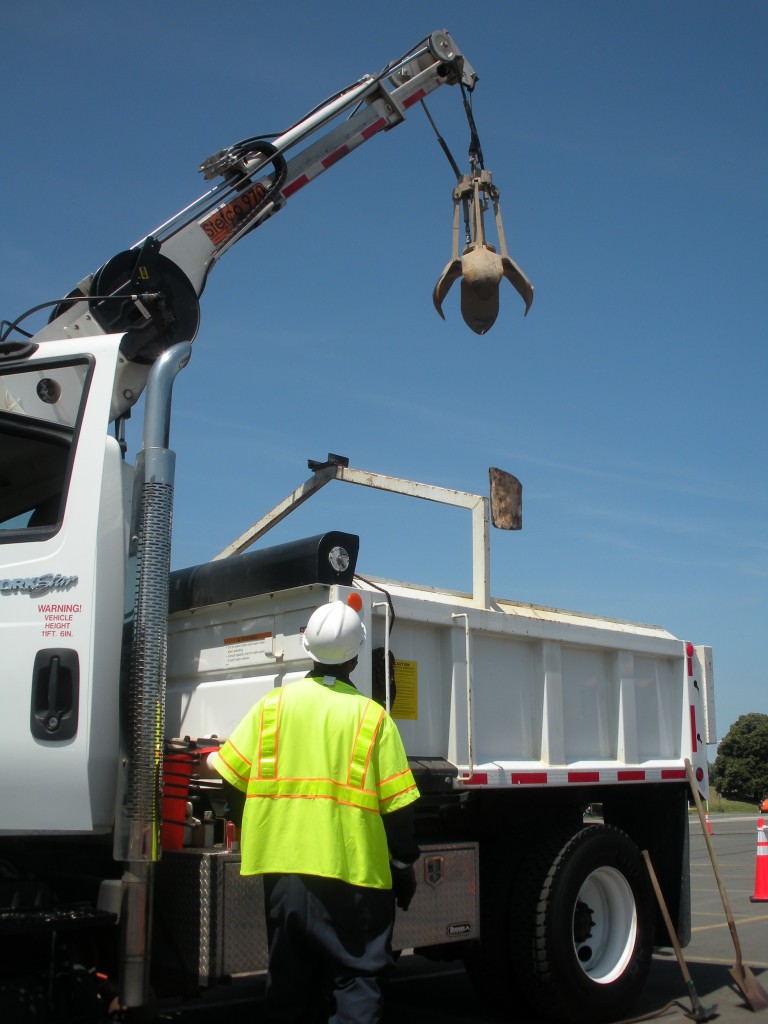By Wayne Savage
Litterblog was on the scene at the D.C. government’s fifth annual “Truck Touch” event June 16 at RFK Stadium, where big rigs from city agencies were available for inspection and horn-honking. Should have brought our ear plugs!
The fire trucks had the longest lines, of course, but your litter blogger headed straight for the equipment that cleans our streets and storm drains.
First up was the Stetco catch-basin cleaner, which looks like a dump truck with a boom attached. At the end of the boom, suspended by cables, is a clamshell bucket that’s narrow enough to slip though a manhole cover and grab whatever debris are in a catch basin.
Otherwise known as storm drains, catch basins usually are built into street curbs, where they gather rainwater and trash that washes off the pavement. From there, the water flows through pipes to rivers and streams or to the Blue Plains sewage-treatment plant. Though an essential feature of the urban infrastructure, catch basins rarely are noticed unless they become clogged with debris, causing street flooding.
D.C. has more than 25,000 catch basins, according to DC Water, which fields a fleet of catch-basin trucks, each with a two-person crew, to clean the basins once a year. DC Water, formerly known as the D.C. Water and Sewer Authority, states that 23 tons of debris are removed from the catch basins every day. The cleaning schedule rotates among various sectors of the city, with crews currently working on the catch basins in the vicinity of South Dakota Avenue N.E.
At the June 16 event, I met Kevin Cockrell, a DC Water veteran who has been operating a catch-basin cleaner for 11 years. I asked him to identify the most common article found in the basins.
“Bottles,” he said. “That’s our big issue.”
Even when trash cans are available on the sidewalk, Cockrell said, people still put their trash in the basin.

Kevin Cockrell of DC Water demonstrates the catch-basin cleaner by dropping a large piece of wood into his truck. (Photos by Wayne Savage)
To demonstrate his prowess with the catch-basin cleaner, Cockrell clamped onto a single green plastic bottle with the Stetco’s bucket, lifted it up and gingerly placed it in a standing position on top of his truck. A crowd of onlookers applauded.
Cockrell said he’s seen fewer plastic bags in the catch basins since D.C. imposed a 5-cent bag fee in January 2010.
“[N]o one wants to pay the 5 cents, and that’s definitely getting lighter,” he said.
Cockrell finds that most catch basins hold at least some water, even during the dry summer months.
“Might be a foot of high water, might be inches of water,” he said. “Depends on how high the outlet is in our basin.”
After cleaning the catch basins, Cockrell tosses in some mosquito-control pellets to prevent growth of their larvae.
In Cockrell’s telling, each basin has its own story, and you never know what you might find inside.
“You just find random stuff,” he said. “Like a turtle was in there the other day. Yeah, he couldn’t get out, so I had to try to get him and put him on the street, but he kept running.”
Sometimes criminals toss guns into the catch basins in an effort to hide evidence. DC Water crews have aided police on more than one occasion by cleaning out a basin and sifting through the debris for a weapon.
Then there is the lore of truly odd ― and disturbing ― discoveries.
“They say in the ’70s someone found a finger,” Cockrell said.
Yikes! I thanked Cockrell for his insights, then headed over to the giant orange Elgin street sweeper.
You’ve no doubt seen D.C.’s mechanical street sweepers in action. Two observations: (1) The outward appearance of Elgin’s three-wheel Pelican model hasn’t changed much since the 1950s, and (2) it’s rather goofy-looking, as if designed by a committee of drunken cartoonists.
Mike Moylan, with Maryland Industrial Trucks Inc., was on hand to talk about the street sweepers he sells to the District of Columbia, his largest customer. He said D.C. has a fleet of 35 street sweepers, including two that run on compressed natural gas (CNG).
The street sweepers range in price from $150,000 to about $300,000, with the CNG sweepers costing about $100,000 more than traditional diesel sweepers, although the cost of diesel rigs is increasing as they are upgraded to comply with clean-air standards, according to Moylan.

Children enjoy a close look at an Elgin street sweeper during the fifth annual "Truck Touch" event at RFK Stadium.
As a steady stream of parents hoisted their kids into the cab of the CNG sweeper on display, I talked with Paul Sneed, a D.C. Department of Public Works employee who has been driving street sweepers for 10 years.
Describing his work week, Sneed said he cleans established routes Monday through Thursday, then joins other sweepers on Friday to clean designated “hot spots” as needed.
Sneed said he may cover 40 miles a day in his sweeper, including travel to and from his cleaning route.
The sweeper’s maximum speed should be no more than 5 to 8 miles per hour when cleaning, Sneed said.
“But keep in mind,” he said, “when we’re driving in the neighborhood, you’ve got the bicycles, Metrobus, cab drivers, UPS, you’ve got FedEx. We’ve all got to share the same road.”
Sneed said his major concern is not hitting anyone with the street sweeper. The big rigs have large windows for visibility, multiple mirrors, and, on the newest CNG models, a video camera in back.
Some D.C. streets are designated for weekly sweeping, with a requirement that residents move their parked vehicles away from the curb for a few hours. That’s better for the street sweepers, Sneed said, “because it’s easier to clean in a straight path than cutting in, cutting out” around parked cars. When the sweepers cut out from the curb, he said, they often drag along some of the trash and it doesn’t have a chance to work itself into the sweeper’s hopper.
The hopper can hold 3.5 cubic yards of trash. When it’s full, the operator raises the hopper to drop the accumulated trash into a dump truck.
“When we first come back [on March 1 after a winter hiatus], it’s real dirty,” Sneed said. “The sand, the salt from the snow season, so you may dump it about three times a day, do the whole A.M. route and P.M. route. Then about this time of year ― June, July ― the streets are pretty clean … caught up, so you may dump it once a day.”
Streets are swept in the District of Columbia only from March 1 through October 31 because the cold temperatures of winter months could freeze the water that sweepers spray onto the streets, causing hazardous conditions.
“You’ve got to like doing it,” Sneed said, reflecting on his work. “It can’t be just a job. … You’ve got a lot of things moving at one time, so you’ve got to have a passion for it.”
Wayne Savage is the owner of Mid-Atlantic Litter Cleanup Service, a Washington, D.C.-based public space litter removal service.

